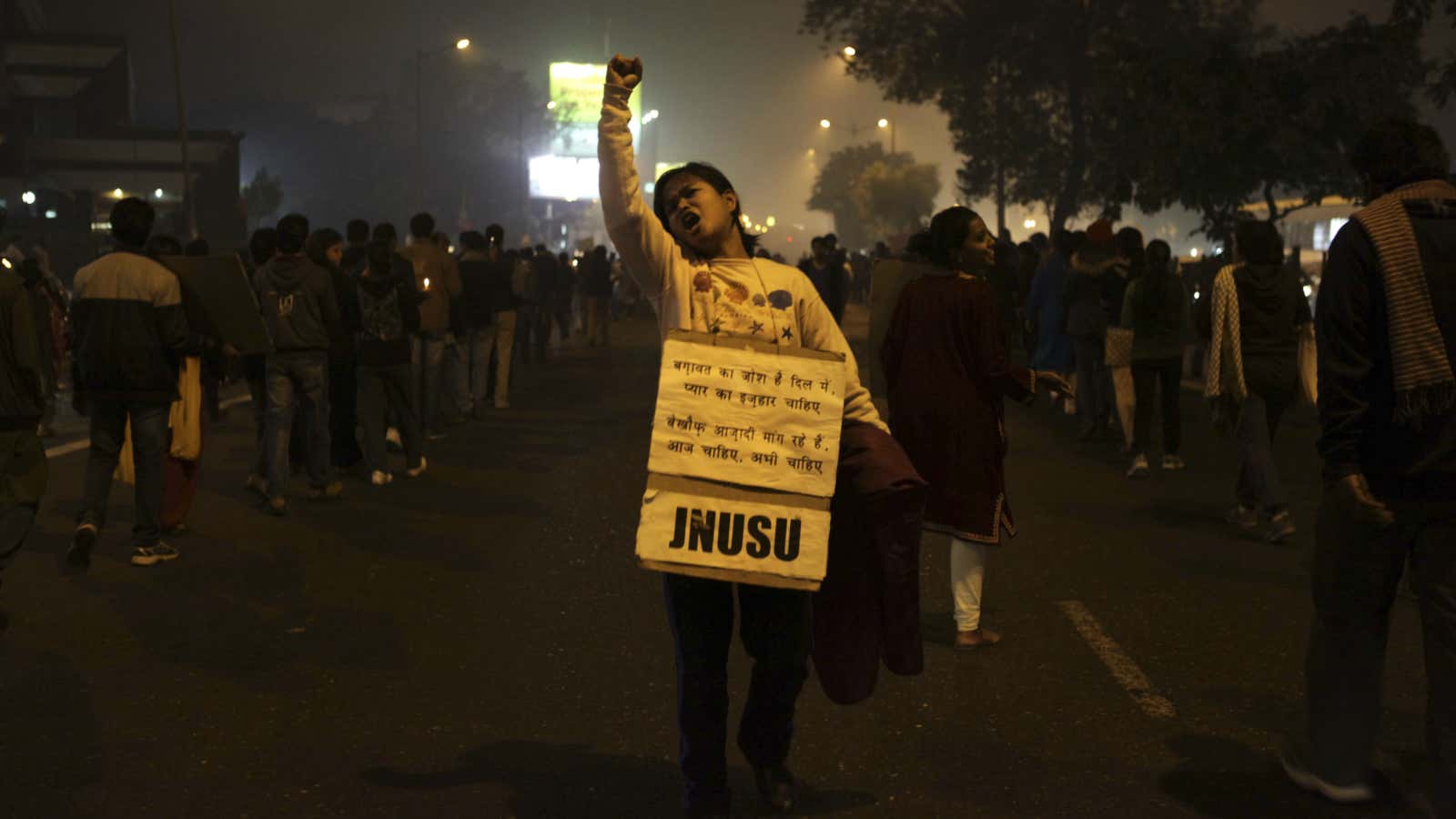Indian taxpayers seem to be a self-righteous lot. Beneficiaries of subsidies, according to them, must display adequate gratitude and the right colour of patriotism. Else, they go for the jugular.
These days, a vocal section of them wants India to stop funding Jawaharlal Nehru University (JNU), one of South Asia’s top-ranked institutions of higher learning. The reason for their outrage is an alleged anti-India protest that took place on the campus in Delhi on Tuesday (Feb. 09).
At the event, some students chanted divisive slogans and questioned the execution of Afzal Guru, who was hanged for the 2001 attack on the Indian parliament.
Since Tuesday, the police have raided university hostels and arrested the president of the students union, charging him with sedition—even though he did not raise any controversial slogans. This is the first time that a JNU president has been arrested since the Emergency of 1975-77.
But this grossly disproportionate and high-handed response by the state to an alleged offence caused by a tiny section of the university’s students has not stopped the taxpayers’ sanctimonious blustering and thundering on Twitter.
Even the voluble TV anchor Arnab Goswami upbraided a JNU student for not exhibiting proper patriotism, despite being a “beneficiary of a subsidized Indian education.”
“Parasite” is a word frequently thrown at JNU students over the last two days.
“It is an institution that has produced some of the most famous economists, lawyers and politicians in India, including the current commerce minister (Nirmala Sitharaman) and the Intelligence Bureau chief till recently (Syed Asif Ibrahim),” Dipankar Gupta, director, Centre for Public Affairs and Critical Theory, told Quartz.
“Such vilification will only prove to be counter-productive,” Gupta, a sociologist, said.
The sheer hypocrisy
Such resentment, though, is not new. It surfaces every time students of liberal universities such as JNU or the Film & Television Institute of India (FTII) go against what is perceived as mainstream opinion.
Yet, most Indians have no problems with the government funding the Indian Institutes of Technology (IITs) or the Indian Institutes of Management (IIMs), even though many of their graduates end up on greener foreign shores. These IIT-NRIs are often put on a pedestal and worshipped as real Indian role models.
While this duality may fall in the realm of the age-old science vs humanities debate, what the angry taxpayers seem to have missed is their own duplicity.
Indians excel at hiding their taxable incomes. An average middle-class Indian goes through innumerable hoops to avoid paying what’s due to Caesar. In any case, only 3% Indians actually pay income tax, and the tax-to-GDP ratio in Asia’s third-largest economy is among the lowest in the world.
At a recent gathering of chartered accountants, this is what Jayant Sinha, the Narendra Modi government’s junior minister for finance, said:
“When you look at the books of your clients as business advisors and chartered accountants, your thinking should not be about tax avoidance… You know India is not a highly taxed country. We have very moderate taxes in India… We have to get our tax-to-GDP ratio from 16/17% to well over 20%. Only then are we going to have the roads, the highways, metro, clean air, the army, the mid-day meals, higher education institution and India of our dreams.
And while these taxpayers swirl in their imaginary pool of benevolence, they should know that India spends a paltry $400 per student per year (pdf), whereas China spends more than $2,700.
Dissent and nation-building
In some of the world’s leading universities, student protesters and their freedom of expression are tolerated even when they bring shame and notoriety to the institution.
Take for example Emma Sulkowicz, a former student of Columbia University, New York.
Sulkowicz began carrying a 22 kg mattress at all times on the campus in 2014, her final year at the university. The visual arts major said she would stop carrying the mattress—a symbol of the burden sexual assault victims have to bear—only when a male student who had allegedly raped her was expelled.
She even carried the mattress to her graduation ceremony in 2015. Despite the negative publicity her act generated for the privately funded university, there was no action taken against her.
Ultimately, her case put the national spotlight on rape on American campuses.
An even bigger example of students’ dissent was the massive protests at American universities against the Vietnam War in the 1960s and ’70s.
“Almost 80% of Americans turned against their own government at that time. But not one person was charged with sedition,” Ashis Nandy, one of India’s best-known sociologists, told Quartz. This even when soldiers returning from war front were being called baby killers.
Student protests have moved mountains in India, too.
In 2013, these “anti-national” JNU students spearheaded an agitation over the gangrape of a woman in Delhi—better known as the “Nirbhaya case”. Besides, decisively turning public opinion against the local Congress party government, they ensured that gender violence became a talking point across the country. This ultimately led to amendments in the rape law.
But somehow, Indian students demanding equal rights for women and minorities are perceived to be less nationalistic than Green Card-seeking NRIs.
No democratic government should penalise public institutions that allow young adults their freedom to dissent, however shrill their tone may be. Funding these universities is not an act of charity, but critical for nation-building.
“We love this country. We fight for the 80% poor population of this country. We trust the constitution of this country. If anyone challenges the constitution, be it the Sanghis, it won’t be tolerated,” Kanhaiya Kumar, president of the students union, said just hours before his arrest.
Harish C Menon contributed to this piece. We welcome your comments at ideas.india@qz.com.
